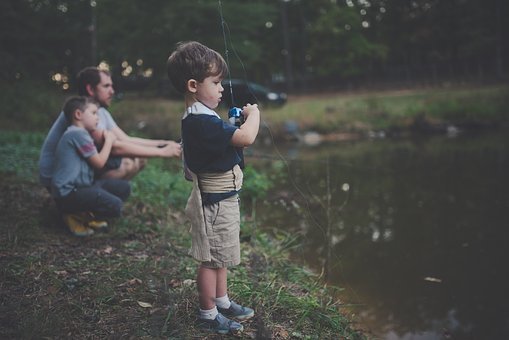A Little More: Bait-and-switch
My 5-year-old son is a master of the bait-and-switch.
This is what I mean: if we're working on his words, and I say, "Cracker," he'll say, "Dadah," and I'll say, "Try again, cr...cr...cr...cracker" in my loud, clear, speech-therapy voice, and he'll say, "Yummy!" or he'll sign eat (and laugh) or even, he'll reach in and kiss me.

source
When we're reading, I'll ask him to think about the letters we see, about the phonics and the text, and he'll point to the pictures instead, and smile his sweet little smile, and tell me (in all earnestness) about the tiny gold bug sitting in the corner of the picture, or about the little lost mitten, and how mittens are for when its cold. "Brrr..." he'll say, and pretend to shiver. "Cold!"
And eating. He's the best of my 3 boys at pushing food around his plate. He'll sign all done, and when I ask him if he's eaten one bite of everything, he'll crinkle his elfin eyes and say, "Yes!" But when I look at his plate, I can see that his 7 beans are still 7 intact beans; only now, several of them are hiding beneath an uneaten piece of bread.
If all else fails, his go-to move is pitching a little fit. He'll throw himself to the ground, fold in half like a pocket knife (he's very flexible), and with his head in his lap, he'll cry great crocodile tears, "Wah wah wah," only every now and then he'll peek to see if anyone is watching.
Avery is my middle son. He has dark blue eyes. His hair is the color of sunlight. His bangs hang down across his forehead and his hair curls a bit at the back of his neck. His skin is so soft. More than my other children, Avery has held on to his babyhood.
He has tiny feet and small hands. Chubby fingers, still, and his soft hair reminds me of a baby. He's the only one who can still fit in my lap. He climbs up and tucks his head into my neck, resting between my chest and my chin, a perfect fit.
He's really pulling out all the stops.
"No, Avery," I tell him. "Mommy loves you so much! But we can snuggle when we've finished our work."
I wonder how my actions would look to an outsider; mean, certainly, maybe even cold-hearted. But they don't see Avery as I do. They don't realize he's pulling the strings. And I don't want him to think his life will be just about manipulating people, about constantly managing other people's expectations of him.
What's right to expect?
Avery has Down syndrome, which means there's an extra chromosome in every cell of his body. This extra genetic material is normal; there's just too much of it. And the excess manifests itself in ways both big and small: it's the reason he's growing more slowly than his brothers; it's also the reason (I suspect) that Avery is so good at reading social cues.
When I was a new mom to Avery, I read a lot of books about Down syndrome. Mostly, what they told me about Avery didn't fit. We haven't had any health issues, even a very serious cold. Avery's hearing has always been fine. These are the good things--there have also been challenges. For instance, he was the latest walker, even late for a child with Down syndrome.
The books I liked best made allowances for these differences, and reminded parents about the other 46 chromosomes at work in their child (half from the mother and half from the father); personality, and family history, and environment all come into play, too.
I think of the stereotypes of Down syndrome in relationship to my son. Avery is happy, yes, certainly, but only sometimes, definitely not always. He's stubborn, too, but how could he help it, with me and his father as his parents? He's shy, like his father, and his brothers. He's careful, like his mother.
I can't tell if Avery's bait-and-switch is a defense mechanism--a way of sliding around something he knows he can't do; a learned behavior that takes attention away from his challenges and puts it onto something else--or if he's just not in the mood. A fine point, perhaps, with a 5-year-old. Still, it's an important one to me. I see how the stereotypes become common; and I see how they might be a misrepresentation. There's more to the story. And I'm wondering how to find out, how to tell.
Which brings me back to words, and the task at hand--showing Avery how to speak for himself. Teaching him how to tell me what he knows, what he needs, what it feels like to be him. Letting him tell me his story, one that might very well begin with a hug.
To listen to the audio version of this article click on the play image.

Brought to you by @tts. If you find it useful please consider upvoting this reply.